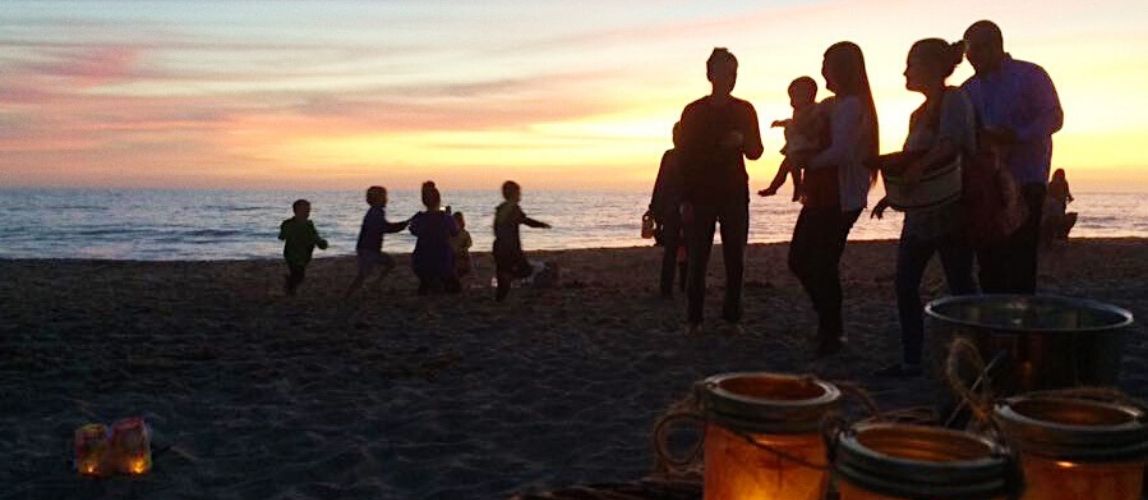I have long loved the quote, “There are only two lasting gifts we can hope to give our children. One of these is roots, the other, wings.” In recent years, we’ve focused a lot on making sure we give our children strong wings and the freedom to fly. But, it’s also so important to stay mindful and intentional about helping make their roots deep and strong. It turns out, family traditions are perfect food for kids’ roots. Traditions are purposeful and repeated practices that involve the members of a family. This can include both routines that organize our day to day lives like like Friday pizza night and seasonal or holiday activities that are more symbolic and planned.
These repeated, shared experiences contribute to making us who we are—and during times of incredible stress during the past two years, they've buoyed us in ways we could not have imagined. In times of stress, sticking to family traditions can be incredibly healing. Psychologists have been researching their importance for over 50 years, and the findings link family rituals not only to increases in children’s happiness and emotional well being, but also to their sense of identity and even success in school.
Not all families face the same challenges, but even when families deal with significant stresses, the creating and nurturing of traditions are linked to better outcomes for kids. No matter the stressors you face, well supported traditions are also linked to higher levels of satisfaction, both overall and marital, for the adults in the family—outcomes that benefit everyone!
What are family traditions and rituals?
“There are only two lasting gifts we can hope to give our children. One of these is roots, the other, wings.”
Even though we spend a lot of time trying to help our kids learn to be independent, family traditions—purposeful and repeated family practices—are the perfect food for kids’ roots. Traditions can include both routines that organize our day-to-day lives such as Friday pizza night, and seasonal or holiday rituals that are more symbolic and planned. These consistent repeated, shared experiences contribute to making us who we are.
Why are family traditions important?
- They give life the good kind of structure. Children need structure and repetition to feel secure and to learn what is important and valued. Traditions, whether waffles every Sunday or apple picking each Fall, mark the passage of time and help children internalize the cyclical nature of life. Read here for family ritual ideas to help keep kids grounded.
- Traditions give us a sense of belonging. Psychologists credit traditions with “establishing and perpetuating what it means to be a member of that group.” Membership can be a powerful source of emotional well being and comes with the understanding that you belong and are both known and cared for.
- Traditions connect us. Rituals can offer a chance to unplug, pause from our harried daily routine and connect, face to face. We often engage multiple senses as we taste and smell special foods, sing or listen to special songs and get our hands busy with the preparation and experience of the ritual, making the connection even more memorable.
- Traditions teach values and connect us to our past. Traditions can give children experiences and stories that help them learn about and remember the elders of their family. As such, they are an opportunity to understand from whom and where we came. They also pass down cultural, religious and family values and may teach religious or cultural norms and ideas. These values come to life and become part of who we are through the symbolism of rituals.
How can we make traditions a part of family life?
Perhaps your family already has a rich set of routines and rituals, but it’s always good to reflect on rituals and, as kids age, look for new ways to include the kids in planning and evolving rituals. Many of us may be looking to include new traditions in our family life, especially in a time when we are looking to bolster kids’ health and wellness. If that is true for you, try some of these ideas:
Add in a special night of the week. We really like to celebrate when we make it to Friday night, especially these days. Our Fridays rotate between movie night, game night, “camp out” and night hike (or swim!). Our kids have gotten so used to this, that we spend some portion of dinner all week long discussing our plans for Friday. Just having a routine and something to look forward to has transformed our weeks.
Keep it simple. Start small. Try things, see what sticks, then stick to that. You can always make a simple practice more complex as the tradition and your kids grow. For example, at dinner, each person in our family shares a “rose” (a highlight) and a “thorn” (a struggle) from the day. One of our kids added a “bud” (something to look forward to). This tradition has helped our children learn to share, reflect and listen to one another, and it’s evolving with us.
Start with what you value most. Do a brainstorm of the values you hold dear, then imagine or search for rituals that make tangible or pass on that value. For example, if gratitude emerges, do something like thanking your local park rangers for the work that they do on National Public Lands Day. If it really works, do it every September.
Find community in nature. Nature offers us special moments that cycle through month after month and season after season. Learn about the phases of the moon or the four “quarter” days of equinox, summer and winter solstice and the midpoints between them. For centuries, people all over the world have noted these points in the solar year with festivals of many kinds, and these moments map to important shifts in our seasons. No surprise, many common holidays are timed around these moments, too.

Test out a ritual for each season this year!
Here is one idea for each of the four:
- Fall Lantern Walk—Our Fall Lantern Walk is an example of a tradition that helps us turn the darkness of “fall back” into a chance to embrace change and celebrate the seasons. Learn more: tinkergarten.com/lantern
- Winter Listening Walks (with treats)—We take hikes and walks all year, but we make sure to listen carefully to the sounds you might easily miss in the winter—part of winter’s often hidden magic. We also bring hot cocoa and warm muffins, but only on winter walks, making them extra special.
- May Day Baskets—We are hooked on acts of kindness done for the pure joy of it, so we make, fill and deliver May Day baskets to neighbors each May 1st.
- Summer Solstice—We live near a marvelous sun wheel built on the University of Massachusetts campus. Hundreds of people gather to see the Summer Solstice sun fall over its special rock. Even if you don’t have a sun wheel nearby, you can note that this day brings the longest amount of daylight of the year. Put on PJs, pack a treat and do a PJ-hike to enjoy a few extra minutes of sunlight together before bedtime.
Cheers to us all for setting aside moments in the day, week or season to unplug for family traditions—it’s likely our best way to nurture our families' roots.

